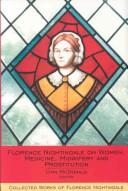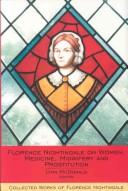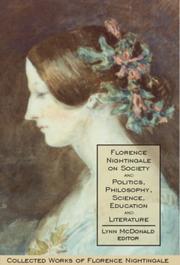
ISBN: 1280925388 9786610925384 0889207062 1417543841 9781417543847 0889203660 9780889203662 9780889207066 Year: 2001 Publisher: Waterloo, Ont. Wilfrid Laurier University Press
Abstract | Keywords | Export | Availability | Bookmark
 Loading...
Loading...Choose an application
- Reference Manager
- EndNote
- RefWorks (Direct export to RefWorks)
Florence Nightingale (1820-1910) is widely known as the heroine of the Crimean War and the founder of the modern profession of nursing. She was also a scholar and political activist who wrote and worked assiduously on many reform causes for more than forty years. This series will confirm Nightingale as an important and significant nineteenth-century scholar and illustrate how she integrated her scholarship with political activism. Indispensable to scholars, and accessible and revealing to the general reader, it will show there is much more to know about Florence Nightingale
Biographies spirituelles --- Spiritual biography --- Spiritual odysseys --- Spiritual quests --- Biography --- Religious biography --- Nightingale, Florence, --- フローレンスナイチンゲール, --- Religion. --- Bible --- Critique, interpretation, etc. --- Criticism, interpretation, etc. --- Nurses

ISBN: 1280925515 9786610925513 0889207046 1417544740 0889203873 9780889203877 9781417544745 9780889207042 9781280925511 6610925518 Year: 2001 Publisher: Waterloo, Ont. Wilfrid Laurier University Press
Abstract | Keywords | Export | Availability | Bookmark
 Loading...
Loading...Choose an application
- Reference Manager
- EndNote
- RefWorks (Direct export to RefWorks)
Florence Nightingale: An Introduction to Her Life and Family introduces the Collected Works by giving an overview of Nightingale's life and the faith that guided it and by outlining the main social reform concerns on which she worked from her call to service at age sixteen to old age. This volume reports correspondence (selected from the thousands of surviving letters) with her mother, father and sister and a wide extended family. There is material on Nightingale's domestic arrangements, from recipes, cat care and relations with servants to her contributions to charities, church and social reform causes. Much new and original material comes to light, and a remarkably different portrait of Nightingale, one with a more nuanced view of her family relationships, emerges.
Nurses --- Nightingale, Florence, --- フローレンスナイチンゲール, --- nursing, medical history, Nightingale biography.

ISBN: 1280280816 9786610280810 0889209162 142372478X 9781423724780 0889204667 9780889204669 9780889209169 Year: 2005 Publisher: Waterloo, Ont. Wilfrid Laurier University Press
Abstract | Keywords | Export | Availability | Bookmark
 Loading...
Loading...Choose an application
- Reference Manager
- EndNote
- RefWorks (Direct export to RefWorks)
Volume 8: Florence Nightingale on Women, Medicine, Midwifery and Prostitution makes available a great range of Florence Nightingale's work on women: her pioneering study of maternal mortality in childbirth ('Introductory Notes on Lying-in Institutions'), her opposition to the regulation of prostitution through the Contagious Diseases Acts (attempts to stop the legislation and otherwise to facilitate the voluntary treatment of syphilitic prostitutes), her views on gender roles, marriage and measures for income security for women and excerpts from her draft (abandoned) novel. There is correspondence with women friends and colleagues from childhood to old age, on a vast range of subjects. Correspondents include old family friends, royal and notable personages, nuns and colleagues in various causes. Most of this material has not been published before and some letters wil be new even to Nightingale scholars. Altogether a very different view of Nightingale emerges from what normally appears in biographies and other secondary sources. This material will enable a new assessment of her feminism, her relations with women and her contribution to improving the status of women of her time.
Women's hospitals --- Women's health services --- Women --- Human females --- Wimmin --- Woman --- Womon --- Womyn --- Females --- Human beings --- Femininity --- Health services for women --- Medical care --- Gynecologic and obstetric hospitals --- Hospitals, Gynecologic and obstetric --- Lying-in hospitals --- Maternity hospitals --- OB-GYN hospitals --- Obstetrics hospitals --- Specialty hospitals --- Social conditions --- Services for --- Hospitals --- Nightingale, Florence, --- フローレンスナイチンゲール, --- Social conditions.

ISBN: 1280280603 9786610280605 0889209332 1417563974 9781417563975 0889204519 9780889204515 9780889209336 Year: 2004 Publisher: Waterloo, Ont. Wilfrid Laurier University Press
Abstract | Keywords | Export | Availability | Bookmark
 Loading...
Loading...Choose an application
- Reference Manager
- EndNote
- RefWorks (Direct export to RefWorks)
This seventh volume in the Collected Works of Florence Nightingale consists of letters, observations, and notes from Florence Nightingale's many trips to Europe, beginning with a family journey when she was a teenager. It includes annotations she made on opera libretti from her ""music mad"" phase and her winter in Rome (1847-48) which were so important in shaping her liberal politics and support for independence movements. Her letters and notes from Greece and central Europe in 1850, and her Kaiserswerth stay in 1851, reveal her developing ideas on social reform, as well as her f
Reformatrices sociales --- Infirmieres --- Women social reformers --- Nurses --- Social reformers --- Nightingale, Florence, --- フローレンスナイチンゲール, --- Voyages --- Travel --- Europe --- Descriptions et voyages. --- Description and travel. --- Description and travel

ISBN: 1280925795 9786610925797 0889207070 0889204292 9780889204294 9780889207073 Year: 2003 Publisher: Waterloo, Ont. Wilfrid Laurier University Press
Abstract | Keywords | Export | Availability | Bookmark
 Loading...
Loading...Choose an application
- Reference Manager
- EndNote
- RefWorks (Direct export to RefWorks)
Florence Nightingale on Society and Politics, Philosophy, Science, Education and Literature, Volume 5 in the Collected Works of Florence Nightingale, is the main source of Nightingale's work on the methodology of social science and her views on social reform. Here we see how she took her ""call to service"" into practice: by first learning how the laws of God's world operate, one can then determine how to intervene for good. There is material on medical statistics, the census, pauperism and Poor Law reform, the need for income security measures and better housing, on crime, g
Nightingale, Florence, --- フローレンスナイチンゲール, --- Grande-Bretagne --- Great Britain --- Civilisation --- Politique et gouvernement --- Politique sociale. --- Civilization --- Politics and government --- Social policy. --- Nurses

ISBN: 1280925876 9786610925872 0889205426 143562839X 0889204462 9780889204461 9781435628397 9780889205420 Year: 2004 Publisher: Waterloo, Ont. Wildfrid Laurier University Press
Abstract | Keywords | Export | Availability | Bookmark
 Loading...
Loading...Choose an application
- Reference Manager
- EndNote
- RefWorks (Direct export to RefWorks)
This sixth volume in the Collected Works of Florence Nightingale reports Nightingale's considerable accomplishments in the development of a public health care system based on health promotion and disease prevention. It follows directly from her understanding of social science and broader social reform activities, which were related in Society and Politics (Volume 5). Public Health Care includes a critical edition of Notes on Nursing for the Labouring Classes, papers on mortality in aboriginal schools and hospitals, and on rural health.
Pauvres --- Soins infirmiers en sante publique --- Sante publique --- Poor --- Public health nursing --- Public health --- Community health --- Health services --- Hygiene, Public --- Hygiene, Social --- Public health services --- Public hygiene --- Social hygiene --- Health --- Human services --- Biosecurity --- Health literacy --- Medicine, Preventive --- National health services --- Sanitation --- Community health nursing --- Industrial nursing --- Nursing --- Disadvantaged, Economically --- Economically disadvantaged --- Impoverished people --- Low-income people --- Pauperism --- Poor, The --- Poor people --- Persons --- Social classes --- Poverty --- Soins medicaux --- Medical care --- Economic conditions --- Nightingale, Florence, --- フローレンスナイチンゲール, --- Nurses

ISBN: 1282232908 9786613810649 1554583829 9781554583829 9780889204706 0889204705 9781282232907 9781554583836 1554583837 Year: 2011 Publisher: Waterloo, Ont. : Wilfrid Laurier University Press,
Abstract | Keywords | Export | Availability | Bookmark
 Loading...
Loading...Choose an application
- Reference Manager
- EndNote
- RefWorks (Direct export to RefWorks)
Volume 15 of the Collected Works of Florence Nightingale, Wars and the War Office, picks up on the previous volume's recounting of Nightingale's famous work during the Crimean War and the comprehensive analysis she did on its high death rates. This volume moves on to the implementation of the recommendations that emerged from that research and to her work to reduce deaths in the next wars, beginning with the American Civil War. Nightingale's writings describe the creation of the Army Medical School, the vast improvements made in the statistical tracking of disease, and new measures for soldiers' welfare. Her role in the formulation of the first Geneva Convention in 1864 is related, along with her concern that voluntary relief efforts through the Red Cross not make war "cheap." Nightingale was decorated by both sides for her work in the Franco-Prussian War. While much of her work concerned the mundane sending out of supplies, we see also in her writing her emerging interest in militarism as the cause of war. Her opposition to the Afghan War (of her time) and her work to provide nursing for the Egyptian campaigns, the Zulu War, and the start of the Boer War are also included.
Soldiers --- Military hospitals --- Military nursing --- Armed Forces personnel --- Members of the Armed Forces --- Military personnel --- Military service members --- Service members --- Servicemen, Military --- Armed Forces --- Combat support hospitals --- Field hospitals --- Hospital service (War) --- Hospitals, Military --- Public hospitals --- Medicine, Military --- Nursing --- Health and hygiene --- History --- Nightingale, Florence, --- フローレンスナイチンゲール, --- British Red Cross Society --- British Red Cross --- Central British Red Cross Committee --- Central British Red Cross Council --- Red Cross (Great Britain) --- Red Cross. --- National Aid Society --- Croce Rossa Britannica
Book
ISBN: 9781554588848 1554588847 9781554582884 1554582881 9780889204713 0889204713 Year: 2012 Publisher: Waterloo, Ontario : Wilfrid Laurier University Press,
Abstract | Keywords | Export | Availability | Bookmark
 Loading...
Loading...Choose an application
- Reference Manager
- EndNote
- RefWorks (Direct export to RefWorks)
Florence Nightingale began working on hospital reform even before she founded her famous school of nursing; hospitals were dangerous places for nurses as well as patients, and they urgently needed fundamental reform. She continued to work on safer hospital design, location, and materials to the end of her working life, advising on plans for children's, general, military, and convalescent hospitals and workhouse infirmaries. Florence Nightingale and Hospital Reform, the final volume in the Collected Works of Florence Nightingale, includes her influential Notes on Hospitals, with its much-quoted musing on the need of a Hippocratic oath for hospitals--namely, that first they should do the sick no harm. Nightingale's anonymous articles on hospital design are printed here also, as are later encyclopedia entries on hospitals. Correspondence with architects, engineers, doctors, philanthropists, local notables, and politicians is included. The results of these letters, some with detailed critiques of hospital plans, can be seen initially in the great British examples of the new "pavilion" design--at St. Thomas', London (a civil hospital), at the Herbert Hospital (military), and later at many hospitals throughout the UK and internationally. Nightingale's insistence on keeping good statistics to track rates of mortality and hospital stays, and on using them to compare hospitals, can be seen as good advice for today, given the new versions of "hospital-acquired infections" she combatted.
Crimean War --- Health Care Reform --- Cross Infection --- Hospitals, Public --- Hospitals, Military --- Hospital Design and Construction --- Crimean War, 1853-1856 --- Health care reform --- Nurses --- Military hospitals --- Public hospitals --- Hospital buildings --- Hospitals --- Health facilities --- Public buildings --- Hospital architecture --- Federal hospitals --- Government hospitals --- National hospitals --- Public institutions --- Combat support hospitals --- Field hospitals --- Hospital service (War) --- Medicine, Military --- Nurses and nursing --- Registered nurses --- RNs (Registered nurses) --- Medical personnel --- Health reform --- Health system reform --- Healthcare reform --- Medical care reform --- Reform of health care delivery --- Reform of medical care delivery --- Medical policy --- Health insurance --- Russo-Turkish War, 1853-1856 --- Russo-Turkish Wars, 1676-1878 --- Eastern question (Balkan) --- Hospital Construction --- Hospital Construction and Design --- Hospital Design --- Hospital Designs --- Hospital Renovation --- Hospital Renovations --- Construction, Hospital --- Design, Hospital --- Designs, Hospital --- Renovation, Hospital --- Renovations, Hospital --- Air Force Hospitals --- Army Hospitals --- Military Hospitals --- Navy Hospitals --- Hospitals, Air Force --- Hospitals, Army --- Hospitals, Navy --- Air Force Hospital --- Army Hospital --- Hospital, Air Force --- Hospital, Army --- Hospital, Military --- Hospital, Navy --- Military Hospital --- Navy Hospital --- Public Hospitals --- Hospital, Public --- Public Hospital --- Health Care Associated Infection --- Health Care Associated Infections --- Healthcare Associated Infections --- Infection, Cross --- Infections, Hospital --- Infections, Nosocomial --- Hospital Infections --- Nosocomial Infections --- Cross Infections --- Healthcare Associated Infection --- Hospital Infection --- Infection, Healthcare Associated --- Infection, Hospital --- Infection, Nosocomial --- Infections, Cross --- Infections, Healthcare Associated --- Nosocomial Infection --- Staphylococcal Infections --- Community-Acquired Infections --- Catheter-Related Infections --- Healthcare Reform --- Health Care Reforms --- Healthcare Reforms --- Reform, Health Care --- Reform, Healthcare --- Reforms, Health Care --- Reforms, Healthcare --- Crimean War, 1853 1856 --- War, Crimean --- epidemiology --- history --- prevention & control --- Influence. --- Hospitals. --- History --- Health and hygiene --- Design and construction --- Buildings
Book
ISBN: 0333517555 Year: 1992 Publisher: London ; Basingstoke : Papermac (a division of Pan Macmillan),
Abstract | Keywords | Export | Availability | Bookmark
 Loading...
Loading...Choose an application
- Reference Manager
- EndNote
- RefWorks (Direct export to RefWorks)
Slagvelden --- Frankrijk --- Wereldoorlog I.
Book
ISBN: 1554587468 1282534297 9786612534294 1554581702 Year: 2009 Publisher: Waterloo, ON : Wilfrid Laurier University Press,
Abstract | Keywords | Export | Availability | Bookmark
 Loading...
Loading...Choose an application
- Reference Manager
- EndNote
- RefWorks (Direct export to RefWorks)
Although Florence Nightingale is famous as a nurse, her lifetime's writing on nursing and to nurses is scarcely known in the profession. Nursing professors tend to ""look to the future, not to the past,"" and often ignore her or rely on faulty secondary sources. Volume 12 related the founding of her school at St Thomas' Hospital and her guidance of its teaching for the rest of her life. Volume 13, Extending Nursing, relates the introduction of professional training and standards outside St Thomas', beginning with London hospitals and others in Britain, followed by hospitals
Infirmieres --- Soins infirmiers --- Nurses --- Nursing --- Formation --- Histoire --- Training of --- History --- Nightingale, Florence, --- Nightingale Training School (Londres, Angleterre) --- Nightingale Training School (London, England) --- Histoire. --- History.

 Search
Search Feedback
Feedback About UniCat
About UniCat  Help
Help News
News